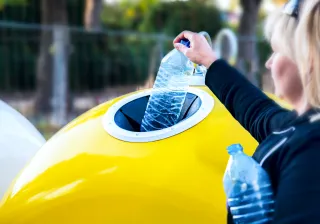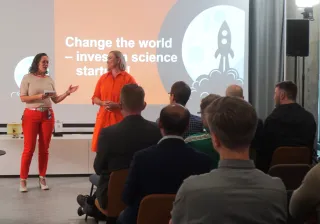What we want from a product made of recycled plastic is high quality, safety and long duration. The same applies to a life partner. The following four revelations draw parallels between the recycling of plastics and being single. They reveal what could be done differently in both to match demand and supply.
1. A lot of rubbish out there
The problem with recycling of plastics is not so much a lack of waste plastics, as limited supply of materials of suitable quality. The phenomenon primarily derives from the fact that recyclability as material is not taken into account in the design of plastic products. Secondarily, the phenomenon is based on quality requirements, meaning that soiled agricultural plastics are not a favoured raw material for use, although there would be reasonable grounds for recovering them out of the fields. The same applies on the dating market, where virtual meeting places, such as Tinder, Bumble and Treffit24, have a large supply of partner candidates but their qualities may be somewhat lacking with a view to reuse.
In 2018, Europe produced 5 million tonnes of recycled plastics, of which 4 million tonnes (80%) was used for new products in the EU area. This is still a small share since, at the same time, European consumers produced more than seven times more plastic waste (29.1 million tonnes) and the industry used almost 15 times more virgin plastic (approx. 60 million tonnes). In Tinder, the share of male candidates is about 62% while the amount of females interested in reuse is only 38%. Furthermore, almost half of the flock of users are reserved, which limits their long-term use. In other words, there is an apparent imbalance in both fields.
The solution is wide-ranging investment in the enhancement of quality, which enables turning even the most difficult material streams into valuable goods. This would increase the number of both uses and users of the material streams in parallel with the increase in the volume of streams.
2. Modelling and sorting make operations more efficient
In the recycling sector, opinions about sorting divides people in two cliques. One of them swears by strict sorting at waste source, even though this would reduce the amount of plastic streams. The other one believes that technologies will solve the sorting problem of plastic waste, because the mixed waste streams are bigger than in the former opinion. Both groups are right, but sorting is still only one step in the plastic recycling.
We must also know how to use recycled plastics! Experimental work creates practical information about the qualities and behaviour of recycled plastics, but we need modelling to make research more efficient.
When choosing a partner, modelling means defining one's own wishes and needs and seeking perfect matches based on them. If you were to meet all the candidates over a coffee, it would eventually lead to an overdose of caffeine and wasting your time in cafés when you could do the job in a targeted manner by sorting the candidates into potential and non-potential alternatives. In Tinder, this is easily done by swiping right or left, whereas in Bumble you need to specify your search criteria in advance. In the dating sector as well, the final certainty of the qualities and usability of the catch must be established by means of practical research.
3. Higher value through customisation
A colleague of mine showed her Tinder offering and commented one of the partner candidates: “Looks all right, but those clothes are distasteful.” I totally agreed: A guy looking like a Nokia engineer from the 1990s, wearing a faded shirt and carrying a mobile phone on his belt, does not appear as an ideal partner in the 2020s.
Adding his value would require customisation. In the field of recycled plastics, this is done by using different treatments. Dirt can be washed off. Unpleasant odours can be eliminated by adding “deodorants” to plastics. Material properties can be improved by means of additives or by mixing recycled plastics with virgin plastics in suitable proportions.
The internal properties of a partner can also be modified in subtle ways: any man can learn to bring you a bunch of flowers even during an ordinary week if the partner appreciates such a thing. Although, an easier option is to buy him a new shirt and secretly get rid of the old 30-year-old version.
4. Safety is the new trend
Reliable, pleasant, suited specifically for you – and safe. These are universally applied criteria when choosing a car, a job, a partner or a plastic product, for example. In a partner, safety means his ability to protect you from the evils of the world, whereas in recycled plastics safety means the management of the chemical risks.
Major chemical loads are accumulated into microplastics found in nature. The insulating plastic sheets contain flame retardants. The fragrance used in detergents, limonene, sticks to the actual package, making its recycling more difficult. In the processing phase, the microbiological issues and occupational safety are yet another story. All these things pose challenges for the use of recycled plastics. To promote this, the future science needs to make investments in their processing and material safety.
The ideal properties of both plastic products and life partners have changed over the past decades, but one thing remains: we want to enjoy of their good properties long into the future. Our society has been built with the help of plastics and people. Let's use them sustainably and invest in recycling whenever possible.
The author of the blog post, Satu Pasanen, is a research scientist at VTT who observes the plastics industry with a twinkle in her eye.




